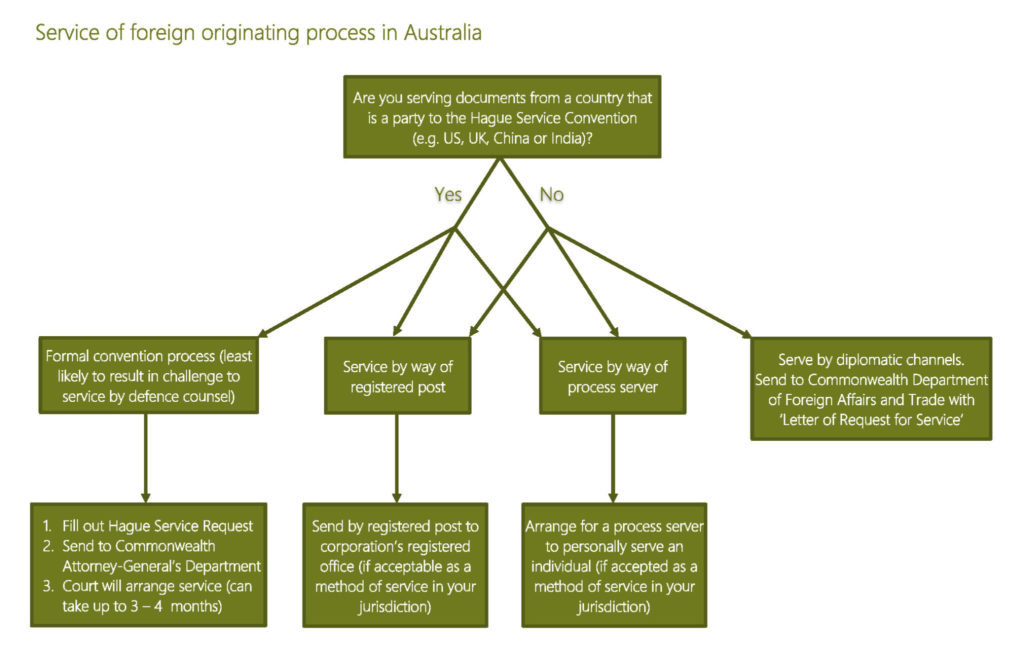Service of a foreign originating process in Australia under the Hague Service Convention
Australia is a party to the Hague Convention on the Service Abroad of Judicial and Extrajudicial Documents in Civil or Commercial Matters 1965 (Hague Service Convention).
Where a foreign country is also a party to the Hague Service Convention, service of a foreign originating process in Australia can be undertaken in accordance with the Convention.
Service under the Hague Service Convention – the approval process
Service under the Hague Service Convention requires an application to a Registrar (a judicial officer of an Australian Court).
The application is made by filling out a Hague Service Request (for example, Form USM-94 in the US) and sending it to Australia’s Central Authority, which is the Commonwealth Attorney-General’s Department.
The application will then be forwarded to the Registrar in the particular State or Territory of Australia where service is to be effected. If the Registrar is satisfied with the application, the Court will arrange for service of the relevant documents in accordance with the application.
Service in Australia in accordance with the Convention generally takes 3 months but it can sometimes take longer. It varies according to the State or Territory that the application is sent to and the location of the intended recipient.
Alternative methods of service under the Hague Service Convention – service by post and by process server
Service of an originating process can in some instances also be effected in Australia by sending the documents directly to the person to be served by way of registered post, rather than under the Hague Service Convention approval process. For this to be valid, service by registered post will also need to be acceptable in the jurisdiction of the relevant foreign country.
However, in some instances Australia’s Court rules do not allow service of certain Court documents by way of registered post. For example, an originating process must be served personally on an individual (rather than a company) as a general rule.
In these instances, service can be arranged through a process server in Australia, to effect personal service. Again, for service to be valid using a process server, service by this method will also need to acceptable in the jurisdiction of the relevant foreign country.
Defence counsel are more likely to question or challenge the validity of service where service is not undertaken under the formal Hague Service Convention approval process.
Service by diplomatic channels
Where a foreign country is not a party to the Hague Service Convention, an accepted practice in Australia is to use diplomatic channels to effect service of foreign originating process. In this situation, documents should be sent to the Commonwealth Department of Foreign Affairs and Trade with an accompanying Letter of Request for Service.
Alternatively, service by way of post or by process server may also be available, depending on the rules of the foreign country.
Personal service
Where the jurisdiction of a foreign country requires that an originating process be served in accordance with local rules, to note is that generally the rules regulating the service of originating process in Australia provide that:
(a) an originating process must be personally served on an individual or corporation;
(b) in the case of an individual, personal service must be effected by physically handing the individual a copy of the originating process; and
(c) in the case of a corporation, personal service can be effected by posting a copy of the originating process to the corporation’s registered office or personally serving a copy of the originating process on a principal officer of the corporation (amongst other means).

This publication covers legal and technical issues in a general way. It is not designed to express opinions on specific cases. It is intended for information purposes only and should not be regarded as legal advice. Further advice should be obtained before taking action on any issue dealt with in this publication.



